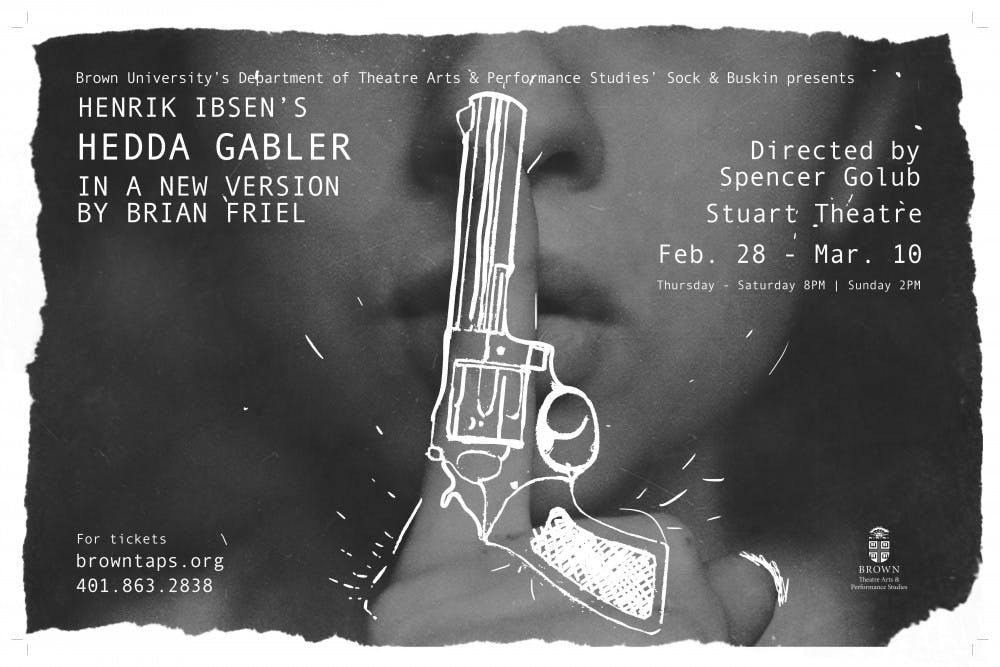On Feb. 28, the Department of Theatre Arts and Performance Studies premiered its rendition of the play “Hedda Gabler” in a new version by Brian Friel, directed by Professor Spencer Golub.
This psychological realist piece written by Henrik Ibsen is being staged from Feb. 28 to March 10 at the Stuart Theatre on Waterman Street.
“This is a living, breathing ‘Hedda Gabler’ that is both dark and darkly comic, sensory and complex,” wrote Golub, a professor of theatre arts and performance studies, Slavic studies and comparative literature, in an email to The Herald. “It takes on the mantle of the ‘classic’ play and tilts it in body and mind.”
In the opening of the play, title character Hedda Gabler appears on stage in a pair of black trousers and a white blouse and searches among the books piled around the stage. She maintains a cold gaze through sunglasses and, after locating a shiny pistol, points it toward the audience, building an ambiance of suspense and tension that persists throughout the play.
After the opening sequence, the first act introduces the newlyweds Hedda and George Tesman. Hedda, who is the daughter of a general and now wife of an aspiring academic, starts off the play with a strong dissatisfaction with her bourgeois lifestyle, over which she has no control.
The play “is a journey of (Hedda) realizing over and over again that she is trapped in this world only to exist for other people and only to exist for the purposes that she serves for men,” said Maia Johngren ’21, who plays the title character in the production.
The entire play takes place in the Tesmans’ living room and a smaller room in their house, with an opaque curtain separating the two spaces. However, with the various props on stage — a cushioned piano seat with wheels, a cabinet and piles of books — performers have a lot of room to express their characters. At some points in the play, Eilert Loevborg and George Tesman, played by Will Conard ’19 and Sam Blustein ’21 respectively, even sit in the audience, watching the play through an observer’s perspective.
“The audience should be allowed to discover the mysteries of a stage production without being alerted to what … the nature of these mysteries might be,” Golub wrote. “This production of ‘Hedda Gabler’ contains many such mysteries and surprises that will excite audiences who appreciate what theatre can be, along with those who think they know what theatre is and cannot be.”
Performing in a department production for the first time, Johngren described the process of engaging with this iconic role as very different from her other experiences in student theatre. Instead of starting with analysis of their roles, Golub began by directing the performers with actions that fit their characters.
“(This method) allowed us to find our characters in these physical actions that he has given to us, and we were coming up with (some actions) in improvisation,” Johngren said.
Getting into the psychology of Hedda, a “complex,” “powerful” and “deeply insecure” figure, was challenging but also very exciting, Johngren said.
Specifically, Hedda’s pregnancy has intrigued Johngren since taking on this role. “I wanted to explore what it was like to have these people talk when she was pregnant and kind of taking control away from her pregnancy,” Johngren said.
The play received praise at its second performance. Audience member Caroline Risner ’22 enjoyed the “slow burns and tensions that build and build for the entire play.”
Having studied this play in her last year of high school, Trisha Ballakur ’22 expressed how serendipitous it is that it was performed when she came to Brown. “There’s so many ways you can analyze this play … with Hedda and her struggle for trying to find her own powers, there’s so many interesting and complex ideas, which I think I’ll still be trying to contemplate for (many) years to come.”
Audience member Aleina Markham ’22 also particularly enjoyed this version’s interpretation of Hedda’s character. “Compliments to the entire cast,” she said.





